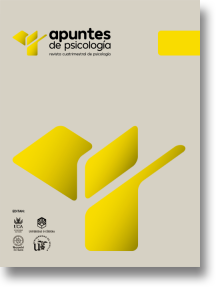Psychometric analysis of the Tornto Empathy Quesrionnaire applied to a spanish sample
DOI:
https://doi.org/10.55414/ap.v41i1.955Keywords:
empathy, Toronto Empathy Questionnaire, emotional indifference, emotional connection, TEQAbstract
The measurement of empathy presents problems associated with both the definition itself and the nature of the construct, as well as the scarcity of research on it. As a consequence, professionals have a limited number of psychometric tests dedicated to its measurement. The purpose of this paper is to analyze the psychometric properties of the Toronto Empathy Questionnaire, a tool for measuring empathy in a unidimensional way, as well as its suitability for use in the Spanish population in research activities. It has been applied to a heterogeneous sample made up of 573 subjects, 65% women (N=373) and 35% men (N=201). The results indicated that to obtain a parsimonious test, a reduced scale of 11 items should be created, instead of the 16 items of the original scale. The new scale would not be strictly unidimensional, because in the Exploratory Factor Analysis four components were isolated, grouped around three different dimensions.
Downloads
References
Archer, D. y Costanzo, M. (1993). The Interpersonal Perception Task-15 (IPT-15): A Guide for Researchers and Teachers (Video-DVD). Berkeley: University of California.
Baron-Cohen, S., Wheelwright, S., Hill, J., Raste, Y. y Plumb, I. (2001). The “Reading The Mind in the Eyes” Test Revised Version: A Study with Normal Adults, and Adults with Asperger Syndrome or High-Functioning Autism. Journal of Child Psychology and Psychiatry, 42(2), 241-251 [DOI: 10.1111/1469-7610.00715].
Baron-Cohen, S., y Wheelwright, S. (2004). The Empathy Quotient: An Investigation of Adults with Asperger Syndrome or High Functioning Autism, and Normal Sex Differences. Journal of Autism and Developmental Disorders, 34(2), 163-175 [DOI: 10.1023/B:JADD.0000022607.19833.00].
Batson, C.D., Turk, C.L., Shaw, L.L. y Klein, T.R. (1995). Information function of empathic emotion: Learning that we value the other's welfare. Journal of Personality and Social Psychology, 68(2), 300-313 [DOI: 10.1037/0022-3514.68.2.300].
Carranza Albán, B.L., y Huamani Urbina, N. (2020). Adaptación del Cuestionario de Empatía de Toronto en jóvenes universitarios de Lima. Tesis de Licenciatura. Lima: Universidad César Vallejo.
Davis, M.H. (1983). Measuring individual differences in empathy: Evidence for a multidimensional approach. Journal of Personality and Social Psychology, 44(1), 113-126 [DOI: 10.1037/0022-3514.44.1.113].
Fernández-Pinto, I., López-Pérez, B. y Márquez, M. (2008). Empatía: Medidas, teorías y aplicaciones en revisión. Anales de Psicologia, 24(2), 284-298.
Hambleton, R.K. y Li, S. (2005). Translation and Adaptation Issues and Methods for Educational and Psychological Tests. En C.L. Frisby y C.R. Reynolds (Eds.), Comprehensive Handbook of Multicultural School Psychology (pp. 881-903). Nueva York: John Wiley & Sons.
Hogan, R. (1969). Development of an Empathy Scale. Journal of Consulting and Clinical Psychology, 33(3), 307-316 [DOI: 10.1037/h0027580].
Igartua Perosanz, J.J. y Paez Rovira, D. (1998). Validez y fiabilidad de una escala de empatía e identificación con los personajes. Psicothema, 10(2), 423-436.
Kourmousi, N., Amanaki, E., Tzavara, C., Merakou, K., Barbouni, A. y Koutras, V. (2017). The Toronto Empathy Questionnaire: Reliability and Validity in a Nationwide Sample of Greek Teachers. Social Sciences, 6(2), 62 [DOI: 10.3390/socsci6020062].
Lawrence, E. J., Shaw, P., Baker, D., Baron-Cohen, S. y David, A.S. (2004). Measuring empathy: reliability and validity of the Empathy Quotient. Psychological Medicine, 34(5), 911-924 [DOI: 10.1017/S0033291703001624].
López-Pérez, B., Fernández-Pinto, I. y Abad García, F.J. (2008). TECA: Test de empatía cognitiva y afectiva. Madrid: TEA.
Mehrabian, A. (1997). Relations among personality scales of aggression, violence, and empathy: Validational evidence bearing on the Risk of Eruptive Violence Scale. Aggressive Behavior, 23(6), 433-445 [DOI: 10.1002/(SICI)1098-2337(1997)23:6<433::AID-AB3>3.0.CO;2-H].
Muñiz, J., Elosua, P., & Hambleton, R.K. (2013). Directrices para la traducción y adaptación de los tests: segunda edición. Psicothema, 25(2), 151-157 [DOI: 10.7334/psicothema2013.24].
Muñoz Leiva, P.S. y Valenzuela San Martín, K.P. (2016). Validación preliminar Cuestionario de Empatía Toronto (TEQ) en una muestra de adolescentes chilenos de las regiones de La Araucanía y Los Ríos. Tesis de Maestría. Temuco (Chile): Universidad de la Frontera.
Rankin, K.P., Kramer, J.H. y Miller, B.L. (2005). Patterns of Cognitive and Emotional Empathy in Frontotemporal Lobar Degeneration. Cognitive and Behavioral Neurology, 18(1), 28-36 [DOI: 10.1097/01.wnn.0000152225.05377.ab].
Seligman, M.E. (2004). Authentic Happiness: Using the New Positive Psychology to Realize Your Potential for Lasting Fulfillment. Nueva York: Simon and Schuster.
Spreng, R.N., McKinnon, M.C., Mar, R.A. y Levine, B. (2009). The Toronto Empathy Questionnaire: Scale Development and Initial Validation of a Factor-Analytic Solution to Multiple Empathy Measures. Journal of Personality Assessment, 91(1), 62-71 [DOI: 10.1080/00223890802484381].
Totan, T., Doǧan, T. y Sapmaz, F. (2012). The Toronto Empathy Questionnaire: Evaluation of Psychometric Properties Among Turkish University Students. Eurasian Journal of Educational Research, 46, 179-198.
Xu, R.H., Wong, E.L., Lu, S.Y., Zhou, L., Chang, J. y Wang, D. (2020). Validation of the Toronto Empathy Questionnaire (TEQ) Among Medical Students in China: Analyses Using Three Psychometric Methods. Frontiers in Psychology, 11, 810 [DOI: 10.3389/fpsyg.2020.00810].
Yeo, S. y Kim, K.J. (2021). A validation study of the Korean version of the Toronto empathy questionnaire for the measurement of medical students’ empathy. BMC Medical Education, 21(1), 119 [DOI: 10.1186/s12909-021-02561-7].
Downloads
Published
Issue
Section
License
Copyright (c) 2022 APUNTES DE PSICOLOGÍA

This work is licensed under a Creative Commons Attribution-NonCommercial-NoDerivatives 4.0 International License.


















